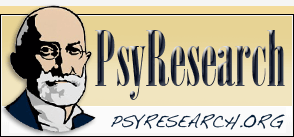 |
||
Journal of Experimental Psychology: Applied - Vol 30, Iss 4 | Random Abstract |
 The mission of the Journal of Experimental Psychology: Applied is to publish original empirical investigations in experimental psychology that bridge practically oriented problems and psychological theory. The journal also publishes research aimed at developing and testing of models of cognitive processing or behavior in applied situations, including laboratory and field settings.
The mission of the Journal of Experimental Psychology: Applied is to publish original empirical investigations in experimental psychology that bridge practically oriented problems and psychological theory. The journal also publishes research aimed at developing and testing of models of cognitive processing or behavior in applied situations, including laboratory and field settings.Copyright 2025 American Psychological Association
- The role of mental representation in sharing misinformation online.
Fuzzy-trace theory (FTT) posits that people share misinformation online if it promotes gist mental representations, cuing motivationally relevant values. Most people value the truth. Thus, per FTT, people decide to share messages that they perceive as true. FTT also predicts that messages will be more effective if they communicate a simple gist. We test these predictions by examining the roles of mental representation and epistemic quality in decisions to share misinformative articles on Facebook across two experiments and two correlational studies. In Studies 1 and 2, we use Facebook data to test the hypothesis that gist proxies in text are associated with online sharing. In Study 3, we experimentally manipulate subjects’ exposure to a gist-based intervention that explains why a misinformative article is false, a simple debunk stating only that the article is false (but not explaining why) and a verbatim condition providing relevant detailed information but allowing subjects to draw their own conclusions. We found that the gist condition decreased intentions to share misinformation. Finally, in Study 4, we replicated this finding and showed that the gist condition also reduces misinformation endorsement. Results provide support for FTT’s predictions regarding reducing sharing and endorsement of misinformation on social media. (PsycInfo Database Record (c) 2025 APA, all rights reserved)

- Metacognition guides intention offloading and fulfillment of real-world plans.
Reminders such as calendar entries and digital alerts are highly effective at helping people remember what they need to do. Recent work has explored the triggers of reminder setting, also known as intention offloading, finding that low confidence is associated with more offloading in laboratory tasks. This supports a metacognitive model of cognitive offloading. Here, we investigated whether this model generalizes to real-world intentions. We asked 112 participants about their upcoming plans and subsequent fulfillment of those plans in two online surveys conducted in 2022. Participants were more likely to set reminders for plans that (a) they were less confident they would remember and (b) they judged to be more important. Participants with lower confidence that they would remember to return for the second survey were more likely to set a reminder for this plan. This, in turn, predicted greater fulfillment. Therefore, ironically, lower confidence predicted greater success. These findings show that intention offloading predicts fulfillment of real-world intentions. They also point toward metacognition as a target for interventions to facilitate this. (PsycInfo Database Record (c) 2024 APA, all rights reserved)

- The metacognition of vigilance: Using self-scheduled breaks to improve sustained attention.
Attention fluctuates over time and is prone to fatigue. Thus, maintaining sustained attention is difficult. The goal of this article is to evaluate the metacognitive penetrability of attention by examining whether dynamic control over the pacing of an ongoing attention-demanding task helps individuals maintain attention. In Experiments 1 and 2, breaks were found to provide a small localized benefit in performance, but self-administered breaks were no more beneficial than ones imposed by the experimenter. Experiment 3 and 4 provided subjects full control over the onset of each trial. Subjects who self-paced stimuli now outperformed yoked controls who experienced the stimuli at a fixed rate and also those who experienced the exact same schedule as the self-pacing subjects. Experiment 5 replicated this set of findings and demonstrated that the benefit of self-pacing was diminished under dual-task conditions. Taken together, it appears that providing workers control over the pace of work allows them to coordinate the occurrence of cognitively demanding events with moments of heightened attention. However, the improvement in performance is subject to important boundary conditions on the parameters of control, does not diminish the vigilance decrement associated with fatigue, and is reduced under conditions in which attention is divided. (PsycInfo Database Record (c) 2024 APA, all rights reserved)

- From surviving to thriving: How preferences shift in helping resource allocation.
The helper’s allocation of helping resources to multiple recipients often involves a trade-off between equality and efficiency. This research examines how the condition of potential recipients (“survival” or “development”) influences the preferences for helping resources allocation in terms of equality and efficiency. Through seven studies, including a field study (Study 6), we discovered that helpers show a higher preference for equality over efficiency when recipients are in a survival situation (i.e., below the survival line) as opposed to in development situation (i.e., above the survival line). This phenomenon is attributed to the different priorities of deontological and utilitarian perspectives in survival and development situations (Studies 3 and 4). Our findings offer insights into the existing research on helping decisions and enhance the understanding of the trade-off between efficiency and equality among helpers. (PsycInfo Database Record (c) 2024 APA, all rights reserved)

- Mapping the traits desired in followers and leaders onto fundamental dimensions of social evaluation.
We applied the social evaluation framework to investigate the traits desired in an “ideal” follower, which were compared to the traits desired in an “ideal” leader. Across three studies and five samples, both differences and similarities in role-specific preferences mapped onto the Vertical–Horizontal dimensions of the social evaluation framework in ways that aligned with the demands of each role. Traits higher on the Horizontal-Morality facet (e.g., cooperative, dutiful) and lower on the Vertical-Assertiveness facet (e.g., confident, ambitious) differentiated ideal follower preferences from ideal leader preferences. Focusing on the traits most strongly desired in relation to each role, traits that supported social coordination and collective goal attainment (i.e., work ethic, cooperativeness) were prioritized in relation to ideal followers, whereas intelligence was prioritized for ideal leaders. Trustworthiness was equally valued across both roles. Moreover, we differentiated between necessary and luxury traits by adjusting the budget individuals could allocate toward the desired traits. Investments in necessary versus luxury traits further supported the social evaluation framework and highlighted the need to account for the facet-level distinctions within the Vertical (assertiveness, ability) and Horizontal (morality, friendliness) dimensions. Further, these findings were found to be robust across manipulations (e.g., the target’s gender and hierarchical level). (PsycInfo Database Record (c) 2024 APA, all rights reserved)

- Quantitative effects of overlay clutter and information access effort: Examining the scan-clutter trade-off in displays with geospatial maps.
Overlaying images from multiple geospatial databases increases clutter and imposes attentional costs by disrupting focusing attention on each database and dividing attention when comparing databases. Costs of overlay clutter may offset the benefits of reduced scanning between two images displayed separately. In two experiments, we examine these attention issues using computational metrics to quantify clutter. We also examine how the scan-clutter trade-off is modified by different levels of clutter, display separation, and task attentional requirements. Participants viewed information from a geographical terrain database and a schematic map database and made judgments that required focusing attention on either database or integrating information across both. In Experiment 1, databases were presented as either overlaid or adjacent displays, and in Experiment 2, as either overlay, adjacent, or more separated displays. Results showed that response time was modulated by the magnitude of clutter, spatial separation, and task type. Results also revealed that clutter costs dominated those of spatial separation, particularly in tasks requiring focused attention. A computational feature congestion metric of clutter effectively predicted performance but could be improved by incorporating an overlay component, which amplified the costs of clutter. The results provide design guidelines for overlay displays (e.g., head-mounted displays) that will minimize the scan-clutter trade-off. (PsycInfo Database Record (c) 2024 APA, all rights reserved)

Back to top
Back to top
© 2025 PsyResearch.org
